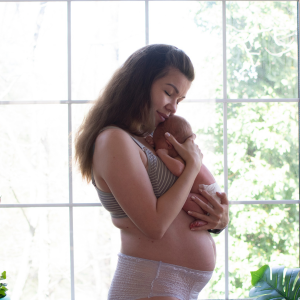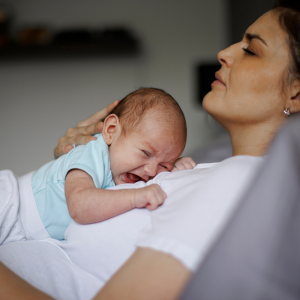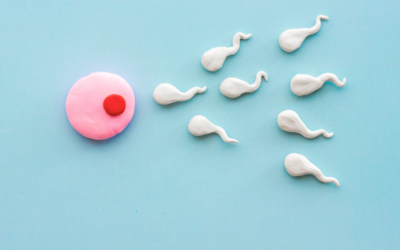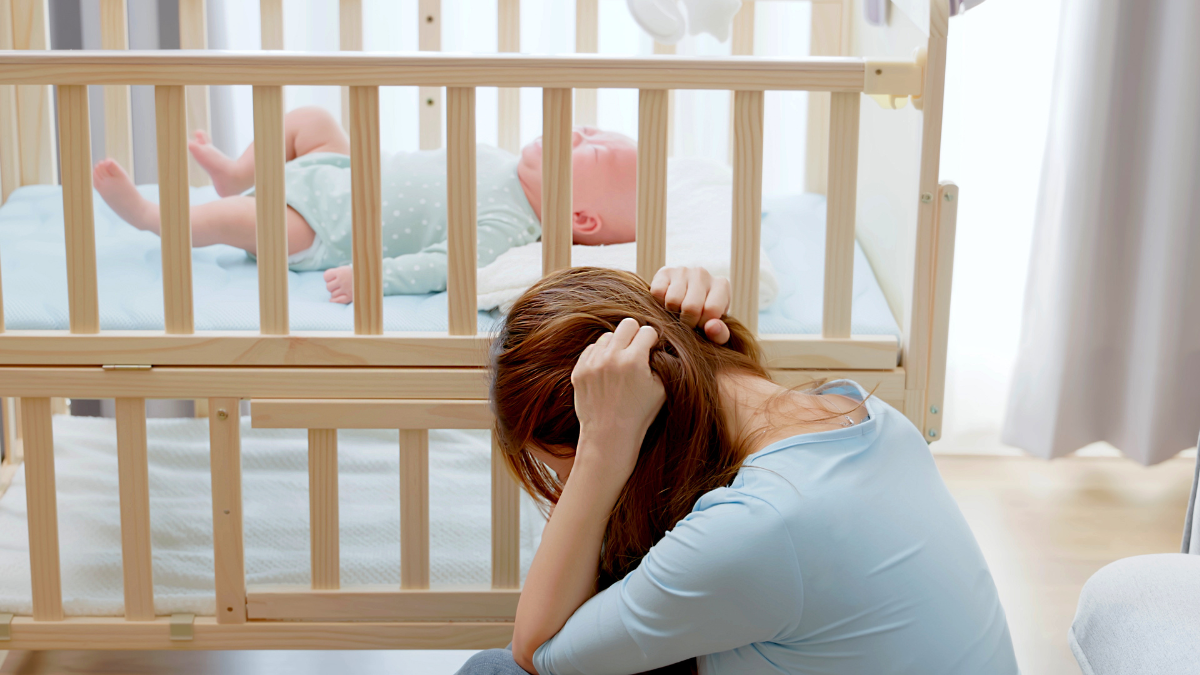Welcoming a newborn should be one of the happiest moments of a woman’s life—but for many new moms, it brings unexpected emotional struggles. Instead of joy, they may feel sadness, emptiness, hopelessness, or overwhelming anxiety. These aren’t just the “baby blues”—this could be postpartum depression, a serious condition that affects 1 in 7 women after childbirth.
Postpartum depression can make you feel guilty, detached, or even afraid to bond with your baby. But you’re not alone, and you’re not to blame. It’s a medical condition, not a personal failure. And the best news? It’s treatable.
In this blog, we’ll explore 7 effective, easy ways to overcome postpartum depression. These simple yet powerful steps can help you heal, recover emotionally, and enjoy motherhood with confidence and peace.
Table of Contents
What is Postpartum Depression?
Postpartum Depression (PPD) is a serious mental health condition that affects some women after childbirth. It goes beyond the common “baby blues,” which are mild mood swings that typically fade within two weeks after delivery. Postpartum depression is deeper, lasts longer, and can significantly impact a mother’s ability to care for herself and her baby.
Key Characteristics of Postpartum Depression:
- Emotional symptoms: Persistent sadness, hopelessness, guilt, irritability, or mood swings.
- Mental symptoms: Anxiety, panic attacks, trouble concentrating, or feeling disconnected from your baby or yourself.
- Physical symptoms: Fatigue, sleep problems (too much or too little), appetite changes, or aches and pains without a clear cause.
- Behavioral symptoms: Withdrawing from loved ones, losing interest in things once enjoyed, or struggling to bond with the baby.

When Does Postpartum Depression Start?
Postpartum depression can begin anytime during the first year after childbirth, though it most commonly starts:
- Within the first 2 to 8 weeks after delivery
- Right after birth, in some cases—especially if there are complications or a history of depression
- Gradually over time, often starting as mild sadness or anxiety that worsens
For some women, symptoms may even begin during pregnancy—this is called perinatal depression.
Important Timeline Breakdown:
- First few days after birth: Many women experience the “baby blues”—mood swings, tearfulness, and irritability. This is normal and usually goes away within 2 weeks.
- 2 to 6 weeks postpartum: If sadness, anxiety, or emotional numbness continues or worsens, it may be postpartum depression.
- Anytime within 12 months after delivery: Postpartum depression can develop months after birth, even if everything seemed fine at first.
What Causes Postpartum Depression?
There’s no single cause of postpartum depression, but several physical, emotional, and psychological factors combine to trigger it. These include:
- Hormonal Changes: After childbirth, levels of estrogen and progesterone drop suddenly. This sharp hormonal shift can disrupt brain chemistry and lead to mood disturbances.
- Physical Stress: The body undergoes intense recovery after delivery—pain, fatigue, and sleep deprivation are common. Breastfeeding challenges and the demands of newborn care can add even more stress.
- Emotional Triggers: Becoming a mother can bring feelings of overwhelm, fear, and uncertainty. Identity changes, body image issues, and the pressure to be a “perfect mom” can all contribute.
- History of Depression or Anxiety: Women with a personal or family history of depression, anxiety, or other mental health issues are at higher risk for postpartum depression.
- Lack of Support: Feeling isolated, unsupported by a partner, or without help from family and friends can make it harder to cope during the postpartum period.

Is Postpartum Depression Common?
Yes, postpartum depression is very common. It affects about 1 in 7 women after giving birth, making it one of the most frequent complications of childbirth.
- It can happen to first-time moms or experienced mothers.
- It affects women of all backgrounds, ages, and income levels.
- Even women who had a smooth pregnancy and delivery can experience it.
Some women may not realize they have postpartum depression because they expect to feel tired, emotional, or overwhelmed. But when those feelings persist or worsen over time, it’s often more than just the “baby blues.”
The good news? Because it’s so common, there are many support systems, treatments, and resources available to help you feel better. You’re not alone—and you’re not failing as a mom.
Why Postpartum Depression Matters
Postpartum depression isn’t just “feeling low”—it can have serious, long-term effects if left untreated. That’s why recognizing and addressing it early is so important.
- It affects bonding: A mother with postpartum depression may struggle to connect with her baby, which can impact emotional development and attachment.
- It delays infant development: Babies rely on their caregivers for emotional and physical support. A mom’s mental health can influence the baby’s sleep, feeding, and overall growth.
- It impacts the mother’s well-being: Untreated postpartum depression can lead to chronic depression, anxiety disorders, and emotional burnout. It can also increase the risk of future mental health struggles.
- It strains relationships: Depression may create tension between partners or lead to social withdrawal, causing moms to feel even more isolated.
Getting help for postpartum depression isn’t just about feeling better—it’s about protecting your long-term health and giving your baby the best possible start in life. Early support makes a big difference.
Benefits of Treating Postpartum Depression
Seeking help and actively managing postpartum depression can lead to powerful and life-changing benefits for both mother and baby. Here’s how:
- Improved Emotional Health: Treatment helps stabilize mood, reduce sadness and anxiety, and restore emotional balance—so you feel more like yourself again.
- Stronger Bond With Baby: As your mental health improves, it becomes easier to connect, nurture, and bond with your newborn, building a healthy foundation for lifelong attachment.
- Better Physical Recovery: When depression is treated, you’re more likely to eat well, rest, and care for yourself—speeding up postpartum healing.
- Increased Confidence as a Mother: Overcoming postpartum depression empowers you, boosts self-esteem, and helps you feel capable, strong, and ready to handle motherhood.
- Healthier Family Dynamics: A supported and emotionally well mother can better communicate, maintain relationships, and contribute to a calmer, more connected home environment.
- Lower Risk of Long-Term Depression: Early treatment greatly reduces the chance of chronic depression or anxiety, giving you a healthier future.
- Positive Impact on Baby’s Development: Babies thrive when their caregiver is emotionally present. Treating postpartum depression can lead to better emotional, cognitive, and social outcomes for your child.
Symptoms of Postpartum Depression
Postpartum depression symptoms can vary from person to person, but they usually go beyond typical “baby blues” and persist for more than two weeks. These symptoms can affect your mood, behavior, physical health, and ability to function day-to-day.
Here are the common signs and symptoms to watch for:
Emotional Symptoms
- Persistent sadness or crying spells
- Feeling hopeless, empty, or overwhelmed
- Mood swings or irritability
- Guilt, shame, or feelings of worthlessness
- Loss of interest in things you once enjoyed
- Difficulty bonding with your baby
- Feeling like you’re a bad mother
Mental Symptoms
- Difficulty concentrating or making decisions
- Racing thoughts or excessive worry
- Anxiety or panic attacks
- Feeling emotionally numb or disconnected from reality
- Thoughts of harming yourself or your baby (seek immediate help if this occurs)
Physical Symptoms
- Fatigue or exhaustion that doesn’t go away with rest
- Insomnia or oversleeping
- Changes in appetite (eating too much or too little)
- Aches, pains, or headaches without a clear cause
Behavioral Symptoms
- Withdrawing from family and friends
- Avoiding activities or responsibilities
- Not enjoying time with your baby or avoiding caregiving
- Increased anger or frustration
Note: These symptoms may begin within the first few weeks after childbirth, but can also start during pregnancy or several months later. If you’re experiencing any combination of these signs for more than two weeks, it’s important to talk to a healthcare provider. Postpartum depression is treatable, and you deserve support.

7 Effective, Easy Ways to Overcome Postpartum Depression
Struggling with overwhelming emotions after giving birth? You’re not alone. The good news is that there are simple, practical steps you can take to start feeling better. Below are 7 effective, easy ways to overcome postpartum depression and begin your journey toward emotional healing and joyful motherhood.
1. Talk About Your Feelings Without Guilt
When you’re going through postpartum depression, keeping it all inside makes things worse. You may feel like you “should be happy” or that talking about your pain makes you a bad mom. But the truth is—talking is healing.
- Start with someone close: A partner, friend, sister, or even a fellow mom can be a great starting point.
- Join a support group: Talking to other moms going through the same struggles helps you feel understood and less alone.
- Consider therapy: A licensed therapist, especially one who specializes in postpartum mental health, can offer a safe space to process your emotions and find healthy coping tools.
Suppressing your emotions can prolong or worsen postpartum depression. You don’t need to “pretend” to be okay. Talking honestly is the first step to healing.
2. Prioritize Rest and Sleep—Even If It Feels Impossible
Sleep deprivation after birth is expected—but if you’re suffering from postpartum depression, it’s even more critical to find ways to rest. Lack of sleep increases anxiety, irritability, brain fog, and emotional overwhelm.
Tips to get more rest:
- Nap when your baby naps: Ignore chores, messages, or to-do lists. Your sleep matters more.
- Share night duties: If possible, rotate nighttime feedings with your partner or a family member.
- Create a restful sleep environment: Dim lighting, quiet white noise, and comfortable bedding can improve the quality of short naps.
- Say yes to help: If someone offers to watch the baby so you can rest, accept it without guilt.
Even small naps or 30-minute rests can reduce fatigue and improve your mood.
3. Fuel Your Body With Mood-Boosting Nutrition
The connection between nutrition and mental health is powerful. During postpartum depression, eating nourishing food can have a big impact on how you feel mentally and physically.
Nutritional tips for postpartum healing:
- Eat complex carbs: Whole grains like oats, brown rice, and quinoa stabilize blood sugar and improve mood.
- Add omega-3 fatty acids: Foods like salmon, flaxseeds, and walnuts reduce depression symptoms and support brain health.
- Stay hydrated: Water supports brain function, and dehydration can make you feel more tired or foggy.
- Avoid sugar overload: Sweet cravings are common, but high sugar intake can spike and crash your energy and emotions.
- Don’t skip meals: Your body is still recovering and needs steady fuel, especially if you’re breastfeeding.
Balanced meals support hormones, energy levels, and mental clarity—all key in overcoming postpartum depression.
4. Get Moving: Gentle Exercise for a Stronger Mind
Exercise might feel like the last thing you want to do when you’re tired and emotionally drained. But physical movement releases endorphins—natural mood boosters—that can reduce depression symptoms.
Safe ways to move during postpartum recovery:
- Walk with your baby in a stroller or carrier: Even 10–15 minutes a day outdoors can lift your spirits.
- Postpartum yoga or pilates: These gentle practices improve flexibility, relax your mind, and reconnect you with your body.
- Stretching and breathing: Simple floor stretches and deep breathing exercises lower cortisol and ease anxiety.
- Dance around the house: Put on your favorite music and move freely—it’s fun, silly, and surprisingly effective.
Exercise doesn’t have to be intense. It just has to be consistent and enjoyable. A little bit every day adds up.
5. Ask for Help—And Don’t Wait Too Long
Many mothers feel pressure to do everything themselves—to “bounce back,” manage the home, cook, clean, and care for the baby—all while looking perfect. This pressure fuels postpartum depression.
You need support, and asking for it is a sign of strength—not weakness.
Ways to seek and accept help:
- Assign tasks to family and friends: Let someone cook dinner, run errands, or babysit.
- Use delivery services: Groceries, diapers, or even ready-made meals can reduce stress.
- Hire help if possible: Postpartum doulas, lactation consultants, or part-time nannies offer invaluable support.
- Be clear about your needs: Instead of saying “I’m fine,” say “I’m overwhelmed and could use help folding laundry.”
Relieving your burden gives you the space to heal emotionally. You were never meant to do this alone.
6. Limit Social Media and Digital Comparison
Scrolling through Instagram and seeing other moms post “perfect” baby photos, spotless homes, or glowing post-baby bodies can make you feel inadequate. But what you see online is often curated—not real.
Tips to protect your mental health from digital pressure:
- Unfollow triggering accounts: You don’t need daily reminders of unrealistic motherhood.
- Follow honest mom pages: Many influencers now share the raw, unfiltered side of motherhood—it’s refreshing and relatable.
- Take screen breaks: Spend a day (or several) offline to reconnect with your reality.
- Practice digital boundaries: No social media before bed or during nighttime feeds.
Comparison fuels self-doubt and guilt—two common elements of postpartum depression. Your journey is unique. Honor it.
7. Seek Professional Help Without Shame
Sometimes, lifestyle changes alone aren’t enough. And that’s okay.
If you’ve tried to cope and still feel stuck in sadness, anxiety, or disconnection, a professional can help you recover faster and more fully.
Types of postpartum mental health support:
- Talk therapy: Therapists can help you reframe negative thoughts, manage overwhelm, and rediscover confidence.
- Cognitive Behavioral Therapy (CBT): Proven to reduce depression by changing harmful thought patterns.
- Medication: In some cases, antidepressants are prescribed. These can be safe during breastfeeding and are effective in managing symptoms.
- Hormonal assessments: Doctors can check for thyroid imbalances or other hormonal issues linked to mood changes.
There is no shame in needing help. The earlier you seek it, the sooner you’ll start to feel better.
Conclusion
Postpartum depression can feel overwhelming, but it’s important to remember that it’s temporary and treatable. You are not alone, and what you’re feeling is not your fault. With the right support, care, and mindset, you can overcome this difficult phase and reconnect with yourself and your baby.
By following these 7 effective, easy ways to overcome postpartum depression, you’re taking real, meaningful steps toward healing. Whether it’s talking openly, resting more, nourishing your body, or seeking professional help—every small action makes a big difference.
Be kind to yourself. You’re doing your best. And with time, support, and self-compassion, you will feel better, stronger, and more confident as a mother.
FAQs
1. How to identify postpartum depression?
You may have postpartum depression if you experience persistent sadness, irritability, exhaustion, anxiety, or difficulty bonding with your baby for more than two weeks after delivery. Other signs include changes in appetite or sleep, overwhelming guilt, and loss of interest in activities you once enjoyed. If these feelings interfere with daily life, it’s time to seek help.
2. Why is pregnancy so hard mentally?
Pregnancy brings massive hormonal shifts, physical discomfort, and emotional pressure. Worries about labor, parenting, body image, and relationship changes can all cause stress, anxiety, and mood changes. These mental challenges are common, and it’s okay to talk about them and ask for support.
3. How to support wife postpartum?
Support her by being present, listening without judgment, and helping with daily tasks like baby care, cooking, and housework. Encourage her to rest, eat well, and take breaks. Be patient and offer emotional reassurance. If she seems overwhelmed, gently suggest professional help and go with her if needed.
4. What are the symptoms of depression in a woman?
Symptoms include persistent sadness, loss of interest, fatigue, irritability, hopelessness, sleep or appetite changes, and difficulty concentrating. Some women may feel guilt, anxiety, or have thoughts of self-harm. These signs can appear postpartum or at any time and should not be ignored.
5. What is the 5 5 5 rule for postpartum?
The 5-5-5 rule suggests:
- 5 days in bed
- 5 days in bed
- 5 days near the bed
This encourages rest and recovery during the first 15 days postpartum. It’s a gentle reminder that healing—physically and emotionally—takes time and should be prioritized.
6. How do I know if I’m depressed?
You may be depressed if you experience prolonged sadness, disinterest in life, low energy, trouble sleeping or eating, feelings of worthlessness, or frequent crying. If these symptoms persist and affect your daily functioning, talk to a doctor or mental health professional.
7. Is it normal to cry postpartum?
Yes, crying in the first few days after birth is common due to hormonal changes and emotional adjustment. However, if the crying continues beyond two weeks or comes with hopelessness, anger, or disconnection from your baby, it may be a sign of postpartum depression and should be addressed with care.







